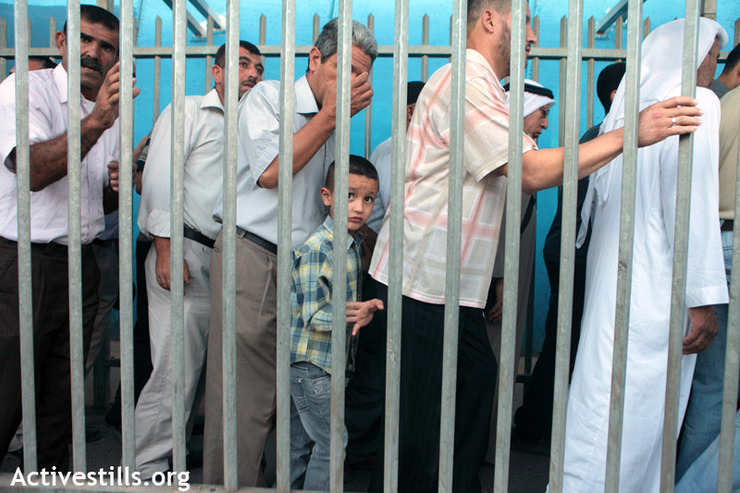The absence of the occupation – the single most important issue which dominates life of Jews and Palestinians in this country – from the Israeli election campaigns, reflects a national existential crisis, and could render the entire democratic process meaningless.
Israelis will go to the polls in four days to determine their future, along with that of several million Palestinians who are under Israeli control. This is the inherent paradox in the Israeli system: a majority voting again and again not to allow a very large minority to participate in its political system. One can view Israel as a democracy only from the standpoint of the Jews and (maybe) a little over 1 million Palestinians who hold Israeli citizenship. From the point of view of other Palestinians, Israel is a brutal dictatorship, which – like many other such regimes – controls them through force and force alone. This is a simple statement of the facts.
This state of affairs could have been somewhat tolerable – if not from the point of view of the Palestinians, than at least according to acceptable international norms – if it was limited in time, or if the Jewish majority was doing everything in its power to terminate the military control over the millions of non-citizens. Clearly, this is not the case. Even among many advocates of the two-state solution, the consensus is that the Palestinians need to win their rights by meeting various Israeli conditions on issues ranging from rights over land, water and air space to the recognition of the Jewish narrative regarding the history of the conflict and the legitimacy of the Israeli ethnic-state. It is a political philosophy that runs contrary to the liberal view that human and political rights are something that a person is born with, and cannot be arbitrarily stripped from a whole community of human beings. The fact that this view is hardly challenged reflects the utter corruption of the Israeli political and moral debate – another result of the occupation.
Only in the fringe of the political system one can find a different approach. Meretz, the most left-wing Zionist party, as well as the non-Zionist parties Hadash, Balad and the United Arab List (Ra’am-Ta’al) demand an immediate recognition of the Palestinians’ political rights and of a Palestinian State, followed by negotiations over the mechanism that would terminate the occupation. Meretz’s plan include annulling the Oslo Accords, which were due to expire in 1999 and have since become part of the system of control over the Palestinians that Israel has implemented.
Interestingly enough, none of the non-Zionist parties advocate a one-state solution – not even Balad. During a meeting that I attended, Balad party leader Jamal Zehalka said that while support for the one-state solution is clearly on the rise in Balad, the idea remains “within an intellectual conversation,” and not part of the official party platform. A couple of right-wing members of Knesset in the Likud have came out in support of handing the Palestinians full rights within Israel, but the idea was never developed beyond general statements; clearly the Israeli right see no reason to challenge the status quo.
The rest of the political parties – represented by over 100 of the 120 members of Knesset – accept this system of ethnic control, which is carried out on a legal level through the distinction between the military-held territories and the rest of Israel, and between citizens and non-citizens (yet make no mistake – it is but one system). Those parties view the Palestinian issue as a matter of conflict-resolution which needs to be managed in the years and decades to come, and they have certain differences among them on the way it should be managed. However, they are united in the denying of civilian, political and human rights from most of the Palestinian population under Israeli control at the present moment.
Recent elections in Israel could be seen as a referendum that sees the Israeli public select the same alternative again and again. Even when Israelis vote “on the economy,” or “on social issues” like those which dominate the current campaign, they vote to deny the rights of the Palestinians. The perception surrounding the vote could be different, but the outcome will not be. This is also a simple fact.
Democracy creates certain added legitimacy for the policies of sovereign states because they are seen as a reflection of “the national will,” as much as such abstractions are possible. But decisions to deny civilian, political and human rights from native minorities are not considered part of the rights of a majority in a democracy, certainly when most of this minority cannot take part in the vote.
In next week’s elections, any outcome that would reaffirm the continuation of control by force over most of the Palestinian population under Israeli sovereignty and does not include recognition of their rights is illegitimate, despite the appearance of a democratic process that preceded it.
Read more:
Bibi can relax – the ‘center-left’ is really on the right
Father who lost daughter in suicide attack to Israelis: Vote for peace
Obama’s attack on Netanyahu could backfire at polls
A real alternative? Tzipi Livni is far worse than Netanyahu


